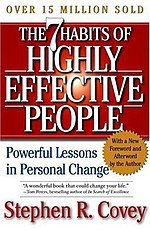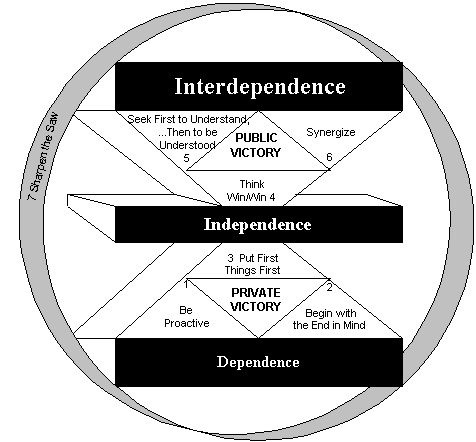In 1996, he was named one of TIME Magazine's top 25 most influential Americans and his best-selling book is entitled The 7 Habits of Highly Effective People.

Covey distills the foundations of personal excellence into seven (good) habits. These habits are directly related to the human virtues we read about in the Catechism 1803-1811. In fact, Covey's 7 habits can be seen as mixtures and applications of the four cardinal virtues: Prudence, Fortitude, Temperance, and Justice.
The graphic below, drawn from his work, describes the connection between the 7 habits.

1. "Be proactive" directly relates to temperance: it involves choosing to control one's emotions and not be reactive. When you are this way, you are also giving justice to others.
2. "Begin with the end in mind" relates directly to prudence: it involves directing the choices you make each moment toward the final goal so that you are useful and moving toward your goals. For Catholics, our main goal is heaven.
3. "Put first things first" relates to justice: it involves giving the most important tasks their due, and the least important task theirs. This results in you finishing the most important things first, leaving time for leisure later.
As one masters the first three habits, one moves from dependence to independence. This takes fortitude!
Habits 4, 5, and 6 are habits that increase the strength of relationships between people. These habits involve all the virtues. Let's take a look at them.
4. "Think win-win" firstly relates to justice: it simultaneously gives to others and yourself what you both deserve--a new and more effective alternative solution to a problem. Everyone deserves to have their problems solved in creative and powerful ways.
Thinking win-win relates to temperance because it takes a lot of self-control to take focus off our own problems and attempt to find a common solution to ours and theirs.
5. "Seek first to understand, then to be understood" relates, once again, to justice: it does not expect others to be just in return, rather you give the attention the other deserves first, then you speak. Often, people simply wish to be heard. Therefore, why not listen first? For most of us, this also involves temperance.
6. "Synergize" is a very complex habit. You might say, it's in "realtime". As such, I feel it relates mostly to prudence, the most practical of the virtues by its very nature. Synergy occurs when groups of people come together and achieve a new level of creativity and productivity that could never have happened. It involves justice in action, but also elements of temperance and fortitude.
7. "Sharpen the saw" is the last habit and it refers to keeping your body, mind, heart, and spirit healthy so that you have enough energy to go out and practice the other 6 habits!
It must be noted that the 7 habits are human virtues of behaviour and attitude, not theological virtues. A book like the 7 habits provides a fertile soil for growth in the theological virtues--faith, hope, and love. We must not stop at private and public victory--we must have Christ live in us in order to have victory over death itself.
As Catholics, we also place importance on the theological habits of receiving the sacraments, praying, and doing corporal and spiritual works of mercy. We must be perfect as our heavenly father is perfect (cf. Mat 5:48).
Do you find the 7 habits difficult to live? If you do, offer up your pain and difficulty for the souls in purgatory, the souls still on earth, and for those you love. Having immense humility makes the habits much easier. Sanctity is a long haul.
I give it 9.5/10
God bless you
Pray for me
No comments:
Post a Comment